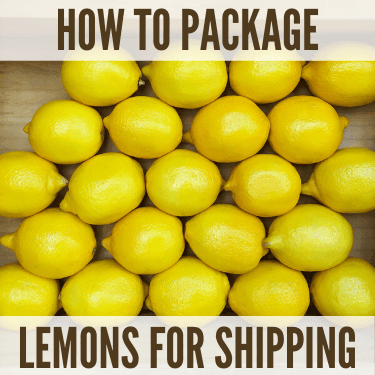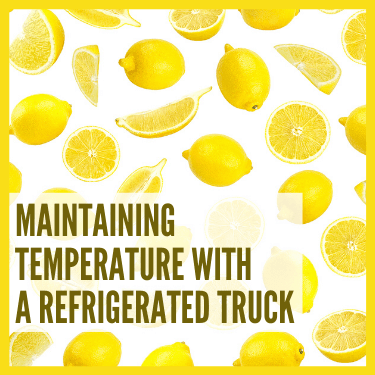Lemons are used for a host of reasons aside just from baking or cooking. They have numerous health benefits, are nutrient-dense, can be antibacterial, and can be used in visual displays. Their universal appeal makes them popular across the country and the world. Lemons’ citrusy goodness are desired year-round, so the sooner you know how to ship lemons, the sooner you can get your lemons from the farm to the consumer.
The process of how to ship lemons can be tedious. The shipper must consider multiple factors in order to get the lemons to their destination safely. Lemons require particular climate conditions, are impact sensitive, and are pressure-sensitive, in addition to other variables that can affect their taste and yellow shine. Refrigerated trucks are an essential part of the transportation process as well, making for a complex lemon transportation process.
Lemons require a semi-dry to dry-subtropical climate or a Mediterranean climate to ripen properly. For that reason, they are often grown for commercial purposes in Argentina, Guatemala, southern Mexico, Chile and China. However, the five countries that produce the most lemons are the United States, India, Argentina, Spain, and Iran.
Only a few states within the U.S. have the right climate for the yellow fruit. Within the United States, lemons are primarily grown in California and Arizona. California commits almost three times the acreage as Arizona, with 45,000 acres to Arizona’s 13,500 acres. There is also a very small amount grown in south Florida (600 acres).
California is the top supplier of citrus between the three. The Golden State supplies fresh citrus to over 80% of the United States and exports citrus fruits to over 16 foreign countries. There are three distinct areas in California where citrus is grown.
Learn more about freight shipping from California to Florida and keep citrus moving, even across the country.
Arizona has a long history within the citrus industry, as they have been producing citrus longer than they have been a state! Arizona has a constant hot and balmy temperature, making it ideal for growing citrus trees. Citrus is a driving force behind the state’s economy and one of Arizona’s Five C’s - citrus, cotton, copper, cattle, and climate. Of all the citrus the state produces, lemons and tangerines are the leading citrus products.
The lemon industry in Florida is a niche market although they were once more prevalent in the Sunshine State (but still not as big as oranges). In the 1970s, a large number of lemon trees were killed by a hard freeze. Such a large quantity died that commercial growers didn’t replant and the Florida lemon industry became less significant than its other citrus fruits.
In 2018, lemon production in the U.S. reached approximately 888 thousand tons. This number was 6,000 tons higher from the previous year, showing that lemons continue to be a popular citrus fruit across the country.

Lemons are perishable items, making proper packaging absolutely essential. Lemons are both impact and pressure-sensitive, so they must be handled with the appropriate care to ensure they don’t arrive damaged. Lemon cargo must be packaged and secured in a way that prevents the fruit from damaging other nearby lemons. Furthermore, in order to prevent slippage or tipping, any spaces between packages or pallets must be filled.
Lemons are typically packaged in cartoons, mini-pack cartons, consumer cartons, or bags. The shipping boxes or cartons must be packed tightly and filled in well to minimize space. Common weights/units that are used when packing are:
Incorrect handling of packaging can cause injury to the peel, which can then cause mold and rot to occur and eventually spoilage. One component to watch is the level of filling cartons. Care should be taken to make sure that cartons are not be filled over the top. Pressure damage can occur when cartons are stacked over overfilled, thereby also causing premature spoilage.
The effects of lemon pressure damage are significant. Bruises become soft and the squashed peel will wrinkle, often referred to as “goose pimples.” Consequences of pressure damage can also mean the fruit will lose its iconic aroma and flavor. Damaged lemons will taste bitter and unpleasant, making them unwanted to the buyer.
In addition to impact and pressure sensitivity, lemons also require particular climate conditions when shipping to ensure they are kept at the correct temperature, humidity/moisture, and ventilation conditions.
Most citrus fruits are highly cold-sensitive but lemons, in particular, are more susceptible to chilling damage. Fruits with a high acid content are more cold-sensitive; the higher the acid content, the greater its cold-sensitivity.
Before loading lemons on trucks, the cargo and any containers should be precooled. This safeguards against a sudden temperature change when starting the transportation process.
There are many side effects to lemons if chilling damage does occur, these include:
There a couple of factors that affect the severity of the chilling damage. One factor is how far the temperature has fallen beneath the limit, with the length of time the lemons are exposed to the temperature being the other factor. In addition, rapidly warming the cooled fruit can result in condensation and spoilage.
Measurements for the lemons’ pulp temperature must be taken throughout loading. The pulp temperature must never fall below 4°C / 39°F or go above 25°C - 30°C / 77°F - 86°F. Temperatures outside of this range impair both storage life and appearance. Any fruits that are punctured to check the pulp temperature must be disposed of because the punctured fruit will quickly spoil and infect other fruit.
Lemons must be protected from moisture, which could possibly come from seawater, rain, condensation, or snow, as moisture promotes green and blue mold and black rot. It is required that relative humidity be kept at 85-90% due to lemons’ high water content (about 90%). However, lemons are able to handle relative humidity of 82-85%.
Lemons do have recommended ventilation conditions, which are:
A supply of fresh air is an important component. Anaerobic respiration can occur when citrus fruits start to ferment. This only takes a few hours to happen and may result in total loss of the fruit. Furthermore, storage damage may occur if ventilation is insufficient, causing the lemons to have a bitter flavor and peel scab.
Fresh fruit continues their metabolic processing even after they are harvested. This means there are levels of respiratory gases, such as ethylene and carbon dioxide, that promote ripening. Levels of respiratory gases should be kept as low as possible. Proper ventilation and fresh air allow those gases to dissipate, preventing storage damage.

The best way to ship lemons is to use a refrigerated truck. Many fruit suppliers utilize a refrigerated truck in order to ship fruit and keep their products in the right climate condition. Refrigerated trucks, or reefers, allow cargo to be transported in a temperature-controlled environment and greatly reduce the risk of storage damage.
Reefer trucks are an essential component of knowing how to ship fresh lemons. Cargo may pass through various parts of the country and in different climates. External weather conditions could affect what’s being shipped, which is why refrigerated trucks are a necessity for lemons.
Refrigerated trucks may use dry ice shipping or gel packs for shipping food and provide many benefits to the supplier, including:
Temperature controlled refrigerated trucks can be customized to meet the needs of the specific supplier. Typically, climate-controlled trucks can maintain a wide range of temperatures, from -29°C / - 20°F to 13°C / 55°F, which can accommodate a variety of cargo. When temperature-controlled trucks are employed, the transportation route is often customized in order to have the most efficient route and transport options.
Finally, refrigerated trucks don’t have to be the sole means of transportation. They can be combined with other types of climate-controlled transport options to provide a comprehensive freight solution to moving the supplier’s product.
You have enough to worry about when it comes to the lemon business, let R+L Global Logistics take care of your transportation needs when it comes to how to ship lemons and other freight shipping food and even freight shipping cleaning product needs. We can supply refrigerated trucks and multiple forms of temperature-controlled transportation to keep your lemons yellow and shiny when they are delivered to their end destination.
Our team of supply chain professionals applies their transportation expertise when handling your lemons, like verifying product temperatures before loading the goods on the trucks. We can provide any and all cold shipping solutions that are needed based on the given situation. Give us a call at (866) 353-7178 and we start moving your lemons as efficiently and safely as possible.
R+L Global Logistics
315 NE 14th St., Ocala, FL 34470